Unconventional oil is petroleum produced or extracted using techniques other than the conventional method. Oil industries and governments across the globe are investing in unconventional oil sources due to the increasing scarcity of conventional oil reserves. Unconventional oil and gas have already made a dent in international energy linkages by reducing US energy import dependency.
Chesapeake Energy Corporation is a company engaged in hydrocarbon exploration. It is headquartered in Oklahoma City. The company is named after the founder's love for the Chesapeake Bay region.
Pennsylvania Spatial Data Access (PASDA) is Pennsylvania's official public access geospatial information clearinghouse. PASDA serves as Pennsylvania's node on the National Spatial Data Infrastructure (NSDI) PASDA is a cooperative effort of the Pennsylvania Geospatial Technologies Office of the Office of Information Technology and the Pennsylvania State University Institutes of Energy and the Environment(PSIEE--http://www.psiee.psu.edu).
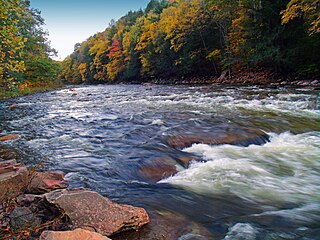
Loyalsock State Forest is a Pennsylvania state forest in Pennsylvania Bureau of Forestry District #20. The forest spans across the northern tier's "Endless Mountains" and is a total of 114,552 acres (46,358 ha). The Loyalsock is a “working forest” and is managed for pure water, recreation, plant and animal habitats, sustainable timber, and natural gas.
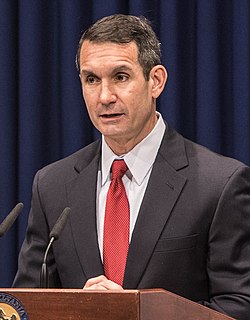
Eugene Anthony DePasquale is an American Democratic politician who is serving as the Pennsylvania Auditor General. From 2007 to 2013, he served in the Pennsylvania House of Representatives, representing the York County-based 95th district. DePasquale announced in spring 2011 that he would seek the office of Pennsylvania Auditor General in the 2012 election. He defeated Republican state representative John A. Maher in the November 6 general election. In the 2016 election, DePasquale was reelected auditor general with 50.0% of the votes, defeating Republican John Brown.

Hydraulic fracturing in the United States began in 1949. According to the Department of Energy (DOE), by 2013 at least two million oil and gas wells in the US had been hydraulically fractured, and that of new wells being drilled, up to 95% are hydraulically fractured. The output from these wells makes up 43% of the oil production and 67% of the natural gas production in the United States. Environmental safety and health concerns about hydraulic fracturing emerged in the 1980s, and are still being debated at the state and federal levels.

XTO Energy Inc. is an American energy company, principally operating in America, specializing in the drilling and production of unconventional oil and natural gas assets, typically from shale rock through a process known as hydraulic fracturing. It is a subsidiary of Exxon Mobil Corporation.
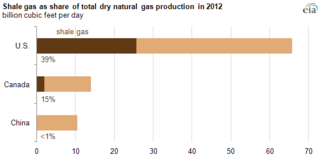
Shale gas is natural gas that is found trapped within shale formations. Shale gas has become an increasingly important source of natural gas in the United States since the start of this century, and interest has spread to potential gas shales in the rest of the world. In 2000 shale gas provided only 1% of U.S. natural gas production; by 2010 it was over 20% and the U.S. government's Energy Information Administration predicts that by 2035, 46% of the United States' natural gas supply will come from shale gas.
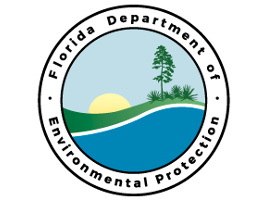
The Florida Department of Environmental Protection (FDEP) is the Florida government agency charged with environmental protection. It is under the nominal control of the governor.
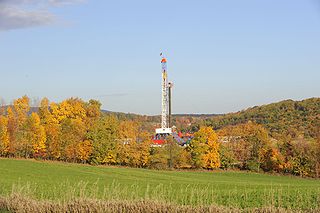
Chief Oil & Gas is a company founded in Dallas, Texas in 1994 by Trevor Rees-Jones. Its primary holdings of natural gas were developed in the core areas of the Barnett Shale in Tarrant County, Denton County and Parker County. In 1999, new technology in horizontal drilling and hydraulic fracturing along with rising gas prices made the Barnett Shale, an unconventional resource for natural gas, more economical. Chief rapidly expanded its leasehold position and drilling and production program in the Barnett Shale to become the fields second largest producer there.

Steven J. "Steve" Santarsiero is a Democratic member of the Pennsylvania State Senate and former member of the Pennsylvania House of Representatives. He represented the 31st district between 2009 and 2017. Most recently, he served as Chief Deputy Attorney General of Pennsylvania for Environmental Protection from May 2017 to January 2018
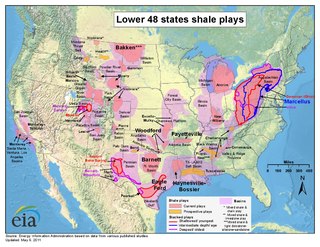
Shale gas in the United States is rapidly increasing as an available source of natural gas. Led by new applications of hydraulic fracturing technology and horizontal drilling, development of new sources of shale gas has offset declines in production from conventional gas reservoirs, and has led to major increases in reserves of US natural gas. Largely due to shale gas discoveries, estimated reserves of natural gas in the United States in 2008 were 35% higher than in 2006.
John Hanger is the former Pennsylvania Secretary of Planning and Policy, serving on the executive staff of Pennsylvania Governor Tom Wolf.

The environmental impact of hydraulic fracturing is related to land use and water consumption, air emissions, including methane emissions, brine and fracturing fluid leakage, water contamination, noise pollution, and health. Water and air pollution are the biggest risks to human health from hydraulic fracturing. Research is underway to determine if human health has been affected, and adherence to regulation and safety procedures is required to avoid negative impacts.
Shale gas in the United Kingdom has attracted increasing attention since 2007, when onshore shale gas production was proposed. The first shale gas well in England was drilled in 1875. A number of wells have been drilled, and favourable tax treatment has been offered to shale gas producers.

The Marcellus is a large and prolific area of shale gas extraction from the Marcellus Formation of Devonian age in the eastern United States. The shale play encompasses 104,000 square miles and stretches across Pennsylvania and West Virginia, and into eastern Ohio and western New York. It is the largest source of natural gas in the United States, and production was still growing rapidly in 2013. The natural gas is trapped in low-permeability shale, and requires the well completion method of hydraulic fracturing to allow the gas to flow to the well bore. The surge in drilling activity in the Marcellus Shale since 2008 has generated both economic benefits and considerable controversy.
The PennEast Pipeline is a proposed project by PennEast Pipeline Company, LLC, a consortium of five energy companies, to move natural gas from the Marcellus Shale region in Pennsylvania to New Jersey. The proposed 36-inch (910 mm) pipeline would run from Dallas, Luzerne County to Pennington, Mercer County, New Jersey, a distance of approximately 115 miles (185 km); as currently contemplated, the maximum allowable operating pressure would be approximately 1,480 psi. The pipeline requres the condemnation of properties in the state of New Jersey, which the state has opposed. A ruling againist such condemnation was handed down in September 2019.













